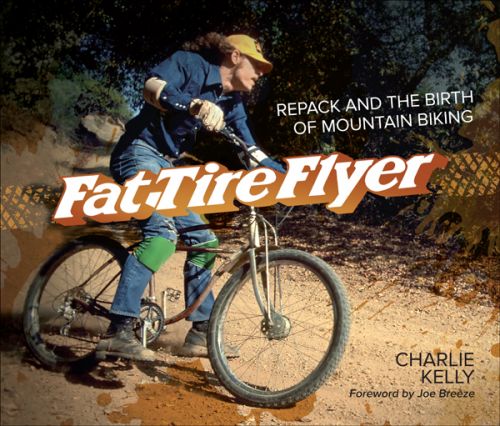LAS VEGAS (BRAIN) — Best known for chronicling the early days of mountain biking as publisher of the sport’s first periodical, Charlie Kelly is legitimately one of the handful of Founding Fathers of the sport, along with his better-known California friends Joe Breeze, Tom Ritchey and Gary Fisher.
Kelly is releasing a new book, Fat-Tire Flyer, this week at Interbike, and he will join two of his fellow pioneers, Breeze and Fisher, to sign copies Thursday from 2 to 4 p.m. at the Breezer Bikes booth (6045).
Kelly has been largely out of the industry since being let go by Rodale’s Bicycling magazine in the late 1980s.
“The bike industry didn’t have a place for me after Bicycling fired me,” Kelly explained.
Soon after leaving Rodale, he founded a piano moving company.
“I wanted something that had nothing to do with bikes and that other people can’t control,” he said of the piano business.
Despite his recent low profile, Kelly was central in the early days.
“He was part of the glue that held it all together,” Joe Breeze told BRAIN recently. “He was the oracle.”
Kelly launched Repack, arguably the first organized mountain bike race. And before joining Rodale he published Fat-Tire Flyer, the first mountain bike periodical.
His contribution to the hardware side is less often remembered. In 1979 he joined Fisher and Ritchey as a partner in MountainBikes, which offered the first complete mountain bikes. In 1982 Kelly sold his share of the company to Fisher, who renamed it Fisher Mountain Bikes.
BRAIN: There’s been a lot written about the early days. Why do we need another history?
Kelly: There are so many accounts by people who weren’t there, who had to interview 40 to 50 people to get a version of the story. This is first person. This will probably be the only first-person account of those events because I’m one of only four people who could have written this. This is going to stand as the definitive history.
What’s the biggest error you wanted to correct?
Kelly: The biggest misconception is that the mountain bike was invented in Marin County. That’s not true. What was invented in Marin County was not the machine. The machine itself was invented in multiple places. What was invented in Marin was the culture of mountain biking.
Gary Fisher, Joe Breeze and Tom Ritchey have gone on to build big companies and remain well known. Does it surprise you to see where they are today?
Kelly: No, every one of them earned what he has. I watched them do it. But if you took me back it would surprise me to know that someday all the bikes in my back yard would have my friends’ names on them. Before, all the best bikes said Colnago or something. There was no way anyone would have predicted the way the mountain bike took over the world. This was a goofy hobby shared by a couple dozen people. Everyone laughed at it, but now I can go anywhere in the world and see my influence on bicycles. Even the president can’t say that. I got to change the culture of the world. That’s part of what this book is about. It was a profound experience that I shared with only three other people.
What was the role of retailers in the early days?
Kelly: When Gary and I started (MountainBikes) we sold to our customers. The bike shops wanted [our bikes] but we were building them in the garage, so how many bike shops could we service? So then Univega and Specialized basically went to Japan to duplicate our bikes to sell to bike shops, and I don’t regret that. And for retailers, it invigorated an industry that had been in the doldrums. But you know there was just this moment where me and my best friend had our own little bike shop and we were building the coolest bikes in the world. It was only about six months before other things started to impact that and things changed. But for that time, I mean, if you are a bike rider, what else do you want out of life?


